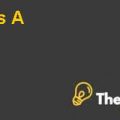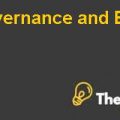
Code of Ethics
Part 1
1) Ethics
a) Define (general)
Ethics are a set of moral guidelines or principles, which provide direction to individuals in the conduct of their behavior. Fundamental ethical principles include: fairness, honesty, care, diligence and respect for others. Ethical conduct involves the use of those ethical principles and guidelines in order to manage the self-interest (Drucker, 1981).
Ethics can be bifurcated into various categories. Personal ethics provide guidelines about the morality and write or wrong behavior with others whereas, business ethics involve the compliance with business policies and practices because professionals owe a responsibility towards their stakeholders that means they have to act with integrity, objectivity and to avoid any actions that can impact its decision (Robinson, 1983).
Business ethics involve the examination of ethical problem that may arise in business that may threaten the interest of stakeholders. Further, business ethics also involve the adoption of the appropriate steps in order to reduce the risk to an acceptable level and to fulfill the responsibility of working in the best interest of the stakeholders.
Unethical behavior can lead to significant personal as well as professional consequences, which may result in a loss of individual’s reputation. Further, unethical behavior of investment professional can lead to a loss of investor’s trust and can also damage the sustainability of the capital market, so in order to manage unethical behavior; the organization must follow professional code of conduct and must incorporate a culture of ethical decisions in the organization.
b) Ethics in finance ( why one should care)
Finance professionals owe a responsibility to protect the wealth of their clients and to invest in securities, which will enhance the value of their clients. Although, the finance industry is highly regulated and the committees have set strong regulations for the professionals to act in the wellbeing of the society and to avoid any actions which can impact their decisions but above all, the personal ethics of the professionals are very important; which guides an individual about the right or wrong behavior.
Ethics in finance involves the protection of financial interest of the client and to conduct the business with transparency and integrity and to protect the interest of their clients. Further, the financial professional has confidential information about the client’s affairs, so they owe fiduciary responsibility to maintain the confidentiality of information that has been entrusted to them.
Professionals are engaged in the effective management of the resources available in the market and the funds acquired from such capital investment will later on be used to produce goods and render services, which will promote improvements in living standard and reduce unemployment, so it is very important that the investors maintain a level of trust over the investment professionals. If the investors started to believe that the investment professional are not acting ethically then they may lose their confidence for investing in capital markets, which may deteriorate the whole economy (Drucker, 1981).
2) Sustainability etc. textbook Page xxxvi
a) Choose 3 of 2
i) Ethical behavior build trust reward
Along with the worthwhile investments in the capital market, it is very important to build the trust of investors through exercising ethical behavior because it will enhance the investor’s confidence and will increase chances of increased investment in the capital market (Robinson, 1983).
Ethical behavior involves the establishment of core values, promote integrity and take responsibility of their investment decisions and to promote quality service which would enhance the worth of the shareholders. Further, the ethical behavior also involves transparency, which involves an evaluation of the proposed opportunity and the investors are provided information of all the pros and cons of the potential investment. All of the activities of professional members will help in developing the investor’s trust and will also encourage them for enhancing their investment in capital market, which will ultimately boosts the whole economy.
Ethical conduct build trust and strengthen business relations, so the employees must promote integrity and honesty and promote adherence with highest standards so as to develop investor’s confidence. Further, if the company fails to adopt an ethical practice then it will not only threaten the investor’s confidence but some time it may also led the closure of the whole company.
ii) Ethical behavior build term and leadership, which underpin process excellence
Ethical behavior involves honesty, trustworthy, morality and authority, which involves in building great leaders. The primary objective of such leaders is to promote ethical code of conduct in the execution of the business and to facilitate an ethical decision making process. Further, it also involves the implementation of ethical guidelines to their subordinates and to promote the importance of ethical culture in the whole organization, which will ultimately build the investor’s confidence and an opportunity to achieve excellent results.
Leaders owe a specific responsibility to implement a culture of ethics and recognize the importance of ethical behavior through their leadership style and ethical behavior. .......................
This is just a sample partial case solution. Please place the order on the website to order your own originally done case solution.













